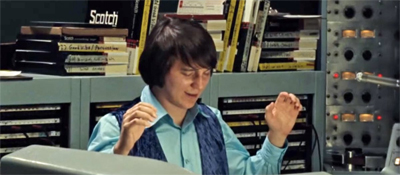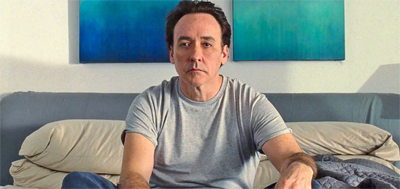The music biography is a surprisingly familiar genre.
For all that there are thousands upon thousands of musicians with their own life stories and histories, the plotting of these sorts of stories always seems to hit on the same beats. The rhythm and tempo might change, but the notes feel the same. This was rather strongly pronounced a decade ago, when Walk the Line and Ray were released in quick succession and Walk Hard: The Dewey Cox story provided a delightfully surreal skewering of the conventions associated with these sorts of films.
There is always a childhood trauma at the root of the story; whether it is a dead relative or parental abuse, there is always a suitable motivator for artistic expression. Similarly, fame is always something of a mixed blessing, with material success only serving to exaggerate a larger spiritual emptiness. Dependencies come rather naturally, whether on drugs or on other people. Eventually, it seems like true love allows our protagonist to find themselves before they find their happy ending. Having a ready-made (and thematically appropriate) soundtrack probably helps.
In most cases, the material is elevated by the skill with which the story is put together. If the film must hit all those familiar notes, then the moving parts make all the difference. Walk the Line and Ray were buoyed by mesmerising central performances from actors at the peak of their game. Love and Mercy hits a lot of these common plot beats as it maps out the troubled life of Brian Wilson. Even a viewer unfamiliar with the arc of Wilson’s life will have a pretty good idea of what to expect from the film.
At the same time, Love and Mercy benefits from a collection of strong performances. Paul Dano and John Cusack play the musician at various stages of his life, jumping back and forth between his controversy-creating career highs and subsequent lows. The bulk of the supporting cast is teamed up with Cusack, creating an interesting circle of characters around Wilson in the late eighties and into the nineties. Elizabeth Banks is Melinda Ledbetter, a Cadillac saleswoman who gets caught up with Wilson. Paul Giammatti is controversial psychotherapist Dr. Eugene Landy.
Love & Mercy is at its best when it feels playful and accessible, and is at its worst when it feels familiar and well-trodden. It is a fascinating sketch at the life and times of Brian Wilson, with a recognisable structure elevated by a great ensemble.
The movie is essentially based around two stretches in the life of Brian Wilson. The first stretch covers Wilson from the development of the Pet Sounds album until the musician’s infamous two (or three) year stint in bed. The second takes place during the late eighties and explores how far Wilson has been led astray by the exploitative psychologist Eugene Landy, who has his own objectives for the former Beach Boy. The empty success of the late sixties is contrasted against the disillusioned isolation of the late eighties.
It is all relatively standard and fairly linear. It is quite clear early on that Melinda Ledbetter’s flirtations with Wilson will threaten to expose the brutal manipulations of Eugene Landy. Love & Mercy is decidedly unambiguous in its portrayal of the situation, portraying Melinda as a selfless woman who even considers distancing herself from Wilson so that she might never exploit him and portraying Landy as a borderline psychotic monster with command and control issues.
There are points where Landy seems ready to burst into manic cackling at just how skilfully he has isolated Wilson and just how much influence he exerts on those caught in his immediate orbit. At one stage, Wilson reveals that Landy has effectively locked him out of his own house; later in the film, it is revealed that Landy has locked all of the cupboards in the house as part of an effort to manage Wilson’s diet. “You are not hungry!” he yells at one point. “You only think that you are!”
Landy could seem like a cliché, and there are points where the character seems like he wandered out of a more cartoonish film. However, Giamatti is as dignified as ever in the role – lending a credibility to a character who could easily come across as a villainous cardboard cut out. At one point, he even raises the lighting to reveal that he was listening into a conversation between Belinda and Wilson all along. It would seem ridiculous if Giamatti didn’t manage to find some faint glimmer of humanity in the character.
Similarly, Belinda could very easily seem like a one-dimensional love interest who exists as both an audience surrogate in introducing Wilson and as a possible vehicle for Wilson’s deliverance from Landy’s clutches. Banks manages to draw a lot out of Belinda, creating a character who feels at once devoted and sensitive to Wilson while also wary of the world into which she has wandered. Banks grounds the character very well, helping Belinda seem like more a real person than she might otherwise be.
John Cusack and Paul Dano do great work as Wilson, a character who could easily be reduced to a bunch of clichés or tics. There are a few uncomfortable moments where Love and Mercy draws a connection between Wilson’s mental health issues and his creative genius, evoking that old stock stereotype about the troubled creative genius. The film doesn’t dwell too long on the point, trust its leads to flesh out the character. Cusack is very good as an ageing Wilson, but Paul Dano does wonderful work effectively carrying his half of the film single-handedly.
Director Bill Pohlad does a solid job with the material. Most of Love and Mercy is very linear, unfolding in two different time periods in parallel. However, there is quite a bit of flourish towards the climax of the film, as Paul Dano’s iteration of the character races towards the “Bedroom Tapes” chapter of Wilson’s life. There is something almost playful about that sequence, as Pohlad uses the two- (or three-) year nap to transition between Dano and Cusack, inviting audiences on an affectionate (and appropriate) homage to 2001: A Space Odyssey.
Love and Mercy is a solid entry in the music biopic genre, strengthened by a strong cast doing good work. It goes without saying that it has a great soundtrack.
Filed under: Non-Review Reviews | Tagged: beach boys, john cusack, love and mercy, non-review review, Paul Dano, review |


























Leave a comment